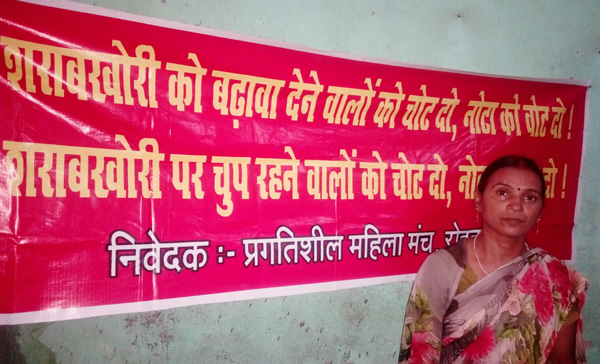Rage against liquor: why the women of Rohtas could choose NOTA

The decision
- In 2007, Nitish Kumar liberalised liquor sales in Bihar
- The BJP was his ally then, and supported the policy
The backlash
- The increase in liquor shops led to a rising alcohol problem
- Women of Rohtas district decide to start a political movement against this
More in the story
- Why the women were forced to take to the streets
- How the small local movement is gaining momentum
One of the highlights of the first phase of polling in Bihar was the high percentage of women who turned up to cast their votes. It's unclear which alliance will benefit from this, though some analysts claim it could end up favouring Nitish Kumar.
Women in Bihar have awakened politically, and credit must go to the decision to make 50% reservation for them in panchayat elections mandatory. This is the first assembly election since the implementation of this policy, and its impact may upset many political equations.
Women voted in large numbers for the BJP during the 2014 general election. However, this was attributed to the Modi wave sweeping across northern India. The jury is still out on whose core voters they really are.
The shift towards NOTA
In Rohtas district, the fragmentation of women's vote is clearly visible.
The region will go to the polls in the second phase on Friday, 16 October. And the word on the street is that the women of Rohtas have decided to oppose both the major alliances. It seems many of them are likely to press the 'None of the Above' button this time.
A lot of them did exactly that in the Lok Sabha election. As a result, the Sasaram parliamentary constituency record 13,000-odd NOTA votes, whereas the adjoining seat, Karakat, polled 11,000-plus such votes.
The alcohol problem
So what's the reason behind the women's decision? Nitish Kumar may have done good deeds for Bihar, but one decision has rendered all of them moot.
In 2007, the Nitish government liberalised the state's liquor policy.
Rohtas is one of the areas mired in the feudal treatment of women. The free availability of liquor on every street corner has had dire consequences for them.
Alcoholism was already a significant problem in the region around Sasaram, and the increase in liquor sales led to a growth in incidents of crimes against women. What's worse, even children started getting addicted to alcohol.
The women of this region were bubbling with rage. Then, one Sunita Singh decided she had had enough. In 2013, Sunita started to mobilise local women against liquor outlets, under the banner of the 'Pragatisheel Mahila Sangh'.
Political struggle, not just social

The campaign began from a liquor shop at Konar Bazaar in Sasaram. Many local children would throng to this particular shop and, as a result, become addicted.
A group of women from the Pragatisheel Mahila Sangh simply went to the shop and locked it. Then vendor didn't dare open it again.
This had a cascading effect on other areas too, and many such actions followed.
Nitish's liberalisation of liquor sales has led to anger among the women of the Rohtas district
"We found that there are over 100 widows in villages like Karwandiya, Bansa and Sitabigha. Most of them had lost husbands due to alcohol addictions. We came to the conclusion that fighting petty vendors is not enough - we will have to wage a political struggle," Sunita says.
Sunita and her co-activists decided to take on both Nitish and the BJP, as both had followed a similar policy on liquor.
They took the issue to the masses by distributing pamphlets and organising meetings during the Lok Sabha elections.
When it became clear they were pitching for the NOTA option, the local administration refused to allow them to hold meetings. It hasn't permitted them this time either.
"We knew the local authorities would oppose our campaign. Therefore, we started distributing pamphlets much before the elections were announced. We have already conducted several rallies and meetings and distributed a lot of leaflets. I am confident the number of women pressing the 'NOTA' button would increase manifold this time," hopes Sunita.
Bhola Shankar, leader of the Communist Centre of India, a workers' union in Rohtas, agrees that Sunita's movement will make an impact.
"This agitation will definitely bear fruit. Thousands of voters supported their campaign during the Lok Sabha election. The number is only going to increase this time," he says.
First published: 15 October 2015, 9:46 IST





![BJP's Kapil Mishra recreates Shankar Mahadevan’s ‘Breathless’ song to highlight Delhi pollution [WATCH] BJP's Kapil Mishra recreates Shankar Mahadevan’s ‘Breathless’ song to highlight Delhi pollution [WATCH]](https://images.catchnews.com/upload/2022/11/03/kapil-mishra_240884_300x172.png)

![Anupam Kher shares pictures of his toned body on 67th birthday [MUST SEE] Anupam Kher shares pictures of his toned body on 67th birthday [MUST SEE]](https://images.catchnews.com/upload/2022/03/07/Anupam_kher_231145_300x172.jpg)






